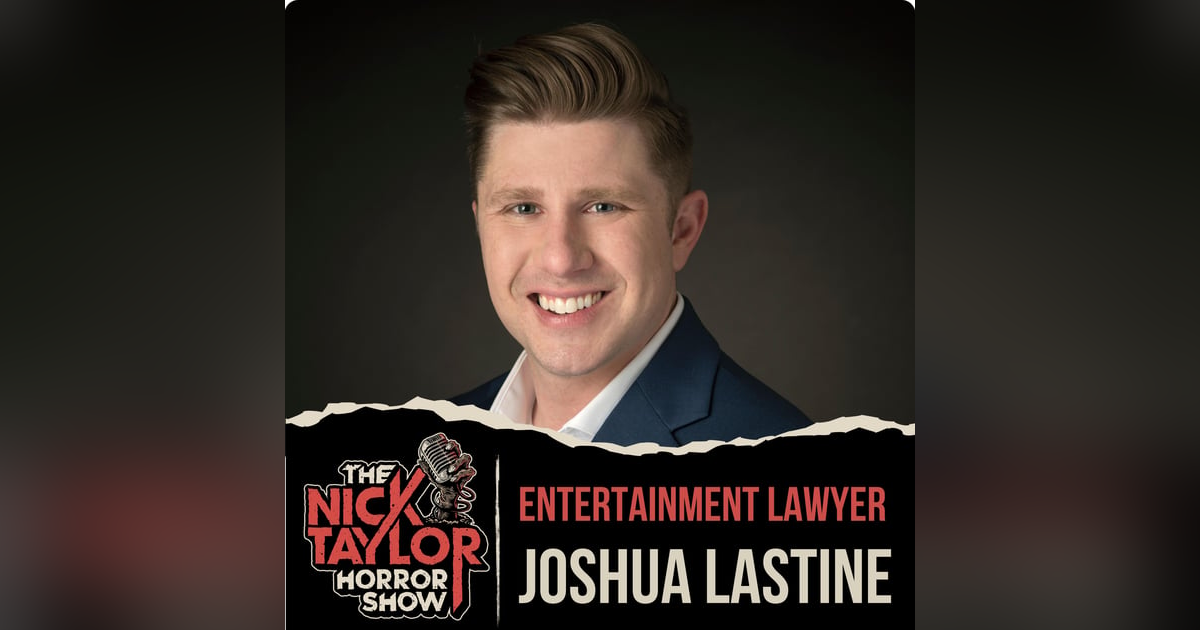Horror Fan/ Entertainment Lawyer, Joshua Lastine

Joshua Lastine is an entertainment attorney and the founder of Lastine Entertainment Law, representing actors, directors, writers, producers and more. A former in-house lawyer at Lionsgate and ViacomCBS, he has worked on high-profile projects such as Halloween (2018) and The Blackening, as well as massive Netflix productions, indie films, and everything in between.
Recognized by Variety as a Hollywood Deal Maker, Joshua also serves as an adjunct lecturer in Entertainment Business Law at The Los Angeles Film School.
A lifelong horror fan with a collection of VHS, DVDs, and Blu-rays, Josh brings deep genre knowledge to his legal practice, helping creators navigate contract pitfalls, IP disputes, distribution hurdles, and budget constraints. Since founding Lastine Entertainment Law in 2021, he has been dedicated to empowering artists and safeguarding their creative rights while bridging the worlds of horror fandom and Hollywood deal-making.
In this conversation, Josh breaks down the legal and contractual realities that every filmmaker needs to understand, from optioning IP and attaching talent to navigating distribution deals and protecting your rights. He also shares practical advice on unions, strikes, and why legal literacy is one of the most empowering tools a creative can have.
On today’s episode of The Nick Taylor Horror Show, here, without further ado, is Joshua Lastine.
Key Takeaways
Build your legal relationship early.
Joshua’s first counsel is simple. Do not wait for a contract to land in your inbox. Grab coffee with an entertainment lawyer, establish rapport, and get them looped in before deals apply pressure. He even outlines a smart starter plan for indies: raise an initial 25K for a line producer, budget, legal, and accounting, so chain of title and financing agreements are set before momentum stalls.
Know your money lanes.
He breaks down the big buckets: equity, debt, tax credits, and crowdfunding. Debt requires careful counsel. Equity means real finance docs and a clean LLC structure. Crowdfunding can be powerful when paired with creative perks, like the Eli Roth “we will kill you on screen” idea that trades access for cash.
Investors buy more than ROI.
For many backers, the value is experience and access: a set visit, a cameo for a family member, festival credentials. Pitch decks and sizzles matter, but so do relationships, attachments, and a clear sense of your project’s look and tone in seconds. Package visually and socially, not just financially.
Product placement is real money.
Joshua points to Smile weaving Voss Water into its story as a character beat, likely putting real cash onto the screen. He and Nick also cite Weapons using Liquid Death cans in a 7-Eleven fight scene. The takeaway: brands can offset costs or boost perceived scale if you integrate them thoughtfully and on-brand.
Keep chain of title airtight.
Lawyers can’t help if ownership is murky. Joshua stresses that rights must flow cleanly from screenplay to delivery, or distributors and E&O carriers will balk. This is the “heavy lifting” that protects your sale, your investors, and your future library value.
Use AI and templates with judgment.
For tiny, low-risk projects, basic templates or AI can help you start. The moment budgets rise, name talent appears, or you touch debt and distribution, you need a lawyer shepherding the paperwork and negotiating terms. That is the difference between scrappy and exposed.
Understand franchise rights before you touch legacy IP.
He flags how messy rights can be. A Nightmare on Elm Street and Friday the 13th remain tangled. Chucky and Child’s Play split across different rightsholders, which is how we got the Aubrey Plaza reboot while the Mancini-led “Chucky” continues elsewhere. Do not assume public familiarity equals available rights.
The market is hungry for horror, but taste still matters.
Joshua and Nick call out the current wave: PVOD windows are the new Friday night, Smile and Smile 2 did numbers, and fandom can lift scrappy indies to theaters. Not every film will be for every viewer, but well-crafted, fan-forward work travels.
Pitch like a pro.
In 2025, you need a sizzle that communicates look, feel, and vibe instantly, plus a deck, attachments, and a clear plan to reach your audience. You are not just selling a script. You are selling probability of execution and a credible route to eyeballs.
Career durability is strategic.
Joshua’s role model stance is “boots on the ground” counsel who keeps the train on the tracks while clients grow. Filmmakers should mirror that mindset: keep learning, keep relationships warm, and build a repeatable process that survives tight cycles and shifting distribution norms.
Show Notes
Movies Mentioned
- Abraham’s Boys
- Immaculate
- The Exorcist
- Smile
- Smile 2
- Weapons
- A Nightmare on Elm Street
- Friday the 13th
- Child’s Play (2019 reboot noted with Aubrey Plaza) / Chucky universe
- The Texas Chainsaw Massacre: The Next Generation
- Killer Joe
- A Time to Kill
- Evil Dead
- Evil Dead II
- Army of Darkness
- Cabin in the Woods
- Suspiria (Guadagnino remake referenced)
- It (1990, Tim Curry)
- Jurassic Park
- Scream
- Leprechaun
- War of the Worlds (remake referenced)
- Thor
- The Black Phone 2
- Agonist (short)
- REM (short)
Books & Resources
- Making Movies by Sidney Lumet
- Story by Robert McKee
- Save the Cat by Blake Snyder
Follow Joshua Lastine at:
- IMBd: https://www.imdb.com/name/nm8524601/
- LinkedIn: https://www.linkedin.com/in/joshua-r-lastine-b3632b42/
- Instagram: https://www.instagram.com/lastinelaw/
- Website: https://lastineentertainmentlaw.com/







